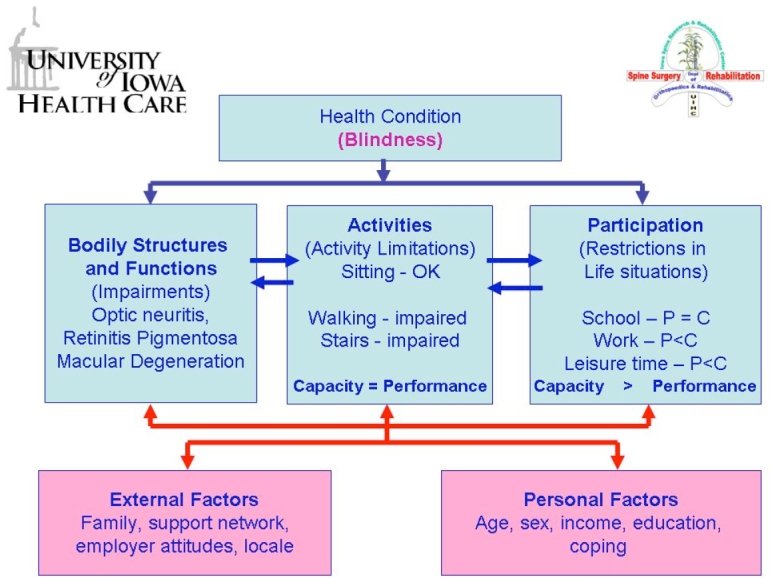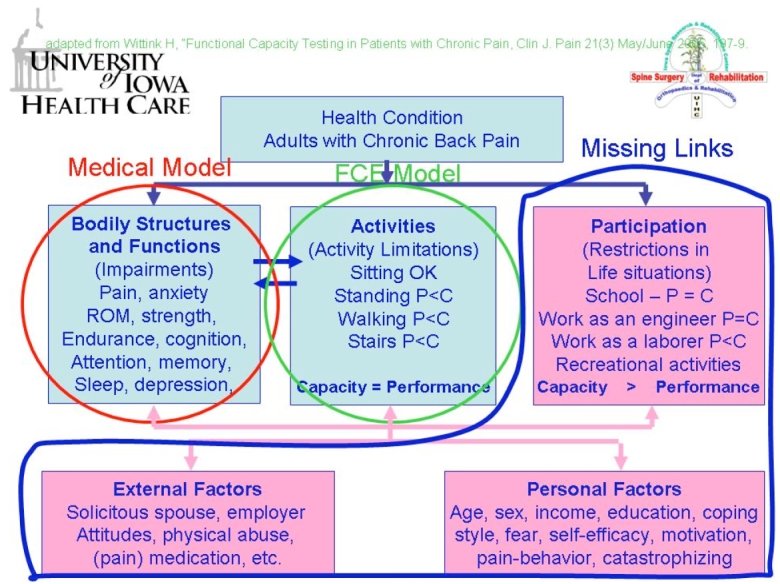FCE is an objective and complete evaluation that analyzes an individual’s ability to perform on-the-job duties as well as activities of daily life after sustaining an injury or condition that might impair their function.
It can provide essential information about the most effective treatment or activity program for people with disabilities. Because of this, both disability attorneys and disability insurance providers often place a high value on FCE results.
Employers may also require functional capacity evaluations to protect themselves and guarantee they are not held accountable for further injuries. A lawyer may also request that the functional capacity evaluation demonstrate whether or not the client is ready to perform job duties.
Sometimes, the insurance company that provides workers’ compensation coverage for the employer will require the test. In all cases, the FCE is conducted by a certified evaluator.
Reasons to go for Physical Ability Evaluation
Although a functional capacity evaluation is not required or even helpful in all circumstances, it can be beneficial when applying for certain types of reasons,
Returning to work. A physician often recommends a functional capacity evaluation (FCE) to establish a patient’s return to job duties after an absence.
When given a year to recover, research indicated that 62.1% of patients were ready to return to work.
Reduce the risk of re-injury. It can also help to assess function and reduce re-injury risk or any other work related injury, because injured workers can overstretch or push a muscle that has not fully recovered if they return to full duty too soon after an injury. The end goal is always to get the worker back to work safely.
For Social Security Benefits. They can assist in establishing your eligibility for workers’ compensation benefits, Social Security, or other benefits.
Can suggest better treatments. A person’s functional capacity report can tell an employee how to get treatment or help them get the right level of benefits, both of which can speed up their recovery and return to job functions.
Estimation for travel The functional capacity evaluation specialist will also determine how long you can leave the country on disability. This time frame may depend on the scope of your disability and the amount of therapy or treatment needed.
An FCE can evaluate a person’s current or potential future job-related skills and abilities after a catastrophic injury (i.e., an automobile accident). Doctors suggest going for FCE to determine the full extent of their injuries.
The merits of functional evaluation
This evaluation may reduce your benefits, but it can benefit everyone.
Your employer will likely be understanding of your situation and grateful that you can work, although at a limited level.
An evaluation of an individual’s ability will help you determine if and when you can return to work and what duties you can do. The risk of reinjury increases if you return to work too soon or take on tasks above your limits, so this is important.
They can also help determine which elements of the person’s physical condition can be enhanced to increase ease and productivity on the job.
Your safety can also be ensured by following this approach. If you lack the power to carry heavy objects, you might injure yourself or a coworker. This examination will help you and others to gain a more excellent knowledge of your strengths and limitations.
In addition, you may need further treatment from occupational therapists. Getting a functional capacity evaluation report might speed up your recovery if you are qualified for certain benefits.
Overall, Functional Capacity Evaluations can assist in ensuring that everyone’s workplace is safe and pain-free.
Who Should Go for a Functional Capacity Evaluation?
The Functional Capacity Evaluation is most suited for those who suffer from physical conditions resulting in symptoms such as
- Abnormal or restricted mobility
- Muscular weakness
- Positioning errors
- Balance concerns
- Chronic pain patients
- Numbness/tingling
- Gross movement discomfort
- Fatigue from physical exertion.
For example, a warehouse worker may not be able to meet their daily lifting and carrying quota if they’ve had a back injury due to the work environment.
The ability to lift and carry heavy objects may be evaluated during the FCE. An FCE report that suggests an injured worker’s safe maximum lifting determinations are the same as before is not promising for a return to work (at least in the same position).
Patients with different conditions, such as brain injuries, spinal cord injuries, muscular and skeletal injuries, and other work injuries, are included.
Remember that most FCE tests aren’t intended to assess the effects of things like deafness, poor vision, or mental health. As the name suggests, they only evaluate physical factors and coordination through behavioral tests.
FCE testing isn’t a valid instrument and should not be performed for
- Patients with cardiac, pulmonary, and psychiatric disorders.
- People with limitations in communicating or comprehending instructions.
- If you currently have surgical or rehabilitative treatment, such as occupational therapy, you should avoid getting an FCE testing done.
- Pregnancy references should be delayed until at least three months after delivery.
Experts’ opinions for functional capacity evaluations
In this video, occupational therapist Mike Balandiat says that the FCE is a set of tests that can be put together objectively to measure a person’s ability to participate in various settings, with a particular influence on work and physical demands.
The most common reasons for doing such a test are to determine whether or not an individual can return to work after suffering an injury, to gauge an individual’s employability, and even to get workers’ compensation.
This video explains why one would go for a physical work performance evaluation by an attorney, Jason Perkins, who specializes in workers’ compensation claimants. He explains in this video that, after experiencing an accident, your doctor may recommend a functional capacity evaluation (FCE) to assess your functional independence and physical capacity level. Doctors commonly use tests like this to establish if you can return to work after an absence to assure maximum medical improvement.
Dr Goerge Bradon, a physical therapist, shares his insights that a Functional Capacity Evaluation (FCE) may benefit all parties. The FCE provides the doctor with the information necessary to impose restrictions on the employee upon reaching maximum medical improvement. It is essential for the injured worker’s health and the company’s financial line. Under professional supervision, the injured worker might get insight into their strengths and limitations.
Steps for Functional Capacity Evaluation
Filing a functional capacity evaluation claim is essential to find the best treatments and activities for disabled people.
The first step is to apply to either your local disability office or the Social Security Administration (SSA). Before taking the FCE, consult with a lawyer who specializes in long-term disability cases.
You must submit proof of your existing limitations for work imposed when requesting a functional capacity evaluation. This could contain medical records, test results, and physician evaluations. It is also essential to offer specific information about any treatments or interventions, like physical therapy or occupational rehabilitation, you have attempted that have not been successful.
As with most doctor’s appointments, you may be required to complete some paperwork. If your injury makes sitting or writing difficult, you can request assistance with this step.
The next step is for a functional capacity evaluation specialist to evaluate your current physical limitations. They can be done with the help of physical and occupational therapists, and it typically includes performing tests that measure strength, endurance, range of motion, and coordination.
The professionals will utilize these findings to design a treatment or activity program exclusively for you that is tailored to your particular requirements with an eye toward the factors influencing results.
Can a physical therapist do a functional capacity evaluation?

Yes, for sure, as researchers have found that professionally administered FCEs are more accurate than self-reported abilities from disabled workers.
That is why a functional capacity examination should be conducted in a clinical setting by a qualified medical expert, such as a physical therapist, an occupational therapist, or a physician.
Part of this is that a worker’s performance on any test can be affected by their attitude and idea of how well they can do. Still, a functional capacity evaluation uses standardized tests to determine how well they can do.
In addition, it is delivered by specialists who can assess these degrees of skill and are among the most accurate methods for determining a patient’s capacity to return to work with optimum physical effort.
This assessment is vital to measure the extent of a worker’s injury and the impact of their limits on their ability to work. Therefore, a professional evaluation of the employee’s abilities is necessary to determine the appropriate level of benefits.
How do you prepare for the functional capacity evaluation?
One must be well-prepared for the FCE, whether taking it to reclaim previous employment or for disability benefits. Communicating openly and thoroughly with the physical therapist beforehand is a great way to be prepared.
You should give thorough answers to all questions and as accurate a data set as possible.
Be prepared to answer questions about your medical history, current physical abilities and limitations, lifestyle habits, and daily activities. Bring your prescriptions and any necessary medical equipment (e.g., eyeglasses, brace, cane, etc.)
You should also have a detailed list of any medications or supplements you take regularly.
While some anxiety level is expected throughout the FCE, extreme stress may harm performance. Make sure you get plenty of sleep the night before and retain a calm, confident attitude and an optimistic outlook during the exam.
Make sure your clothing doesn’t limit your mobility; therefore, dress appropriately and wear practical gear.
Also, think about getting a ride to and from the testing facility. After a day or two of testing, some individuals will be too exhausted to drive safely.
During FCE testing

A functional capacity evaluation consists of the following parts.
A patient interview
The patient’s medical, social, and occupational backgrounds and treatment histories are part of this. Getting to know the patient’s history, their functional ability, developing a connection, and knowing what they are going through are a few main objectives.
A record review
It includes a physical examination, including muscular and skeletal screening. Typically, this is a medical checkup during which various measures of health and fitness for work are taken.
Functional testing
includes looking at the critical work demands, and some specific tasks to measure the condition, such as
- Physical strength
- Postural intolerances
- Balance
- Level of fatigue
- Ability to lift and carry
The examiner will ask you to perform functional testing using different machines, tools, and methods.
Your occupation will determine which assessments you must take. If your job requires you to carry objects, you may need to do strength exercises to find out how much you can lift. Cognitive tests may be included in your FCE testing if your injury or condition has damaged your ability to perform the essential functions of your work.
Some examinations, such as doing simple range-of-motion exercises on a mat, will be accessible. At the same time, some will require using an exercise treadmill, while others will utilize a spirometer to assess lung capacity.
The duty of the evaluator is not limited to providing instruction. In addition to observing your ability to complete these tasks, they will also evaluate your level of exertion and range of motion. During the activities, they will note any signs, such as sweating or shivering.
Pain and psychosocial monitoring
An evaluator will keep an eye on you while you’re testing to ensure you’re giving your best every time with total functional capacity. Second, the examiner will watch how you react to pain and how well you can move. These observations from the evaluator will show how credible the test findings are.
Continue an exercise until you can’t, or the examiner tells you to stop. If your symptoms worsen or you get fatigued, notify the doctor. Also, do not hesitate to inform the examiner if you cannot complete a test.
The duration of a functional evaluation can vary depending on the patient’s abilities. Different assessments can take 3–4 hours to complete; however, this might be more or less time, depending on the specifics of the evaluation and the individual’s health status.
Some functional capacity evaluations are conducted over two days. The second day of the assessment will consist of many of the same tests as the first to quantify any performance decline.
What happens after an FCE test?
The examination findings are analyzed by a qualified examiner, who then determines the person’s ability to return to work, which may involve adjusting the duties according to physical ability.
As an evaluator, a physical therapist will use the results of a functional capacity evaluation (FCE) to create a unique treatment plan for each patient.
Or these observations will be documented in a report, which will subsequently be utilized in your workers’ compensation case.
Lifestyle changes, such as adjusting work surroundings or daily routines, may also be recommended, along with specific workouts or activities. The physical therapist may suggest additional sessions to monitor the patient’s progress and physical demands.
The findings of an FCE test can also assist individuals in making educated decisions about their healthcare requirements. Still, they cannot ensure the safety of any activity or treatment plan due to the involvement of multiple factors.
To ensure safety and efficacy, it is essential to always work with a certified healthcare professional and adhere to all directions given.
What happens if you fail a functional capacity evaluation?
If a person fails a functional physical ability evaluation, their physical abilities and limits do not meet the therapist’s criteria. This might put them at the chance of being unable to do activities of daily living such as dressing, bathing, or even walking.
Even if you get these results, your case is still open. You can still file an appeal against the evaluation results. Because of this, you might have to retake the test or talk to a lawyer specializing in workers’ compensation.
This video explains a small review by Luke Gordon, a physical therapist, on things that shouldn’t be done during the FCE process to improve test outcomes. He says you shouldn’t fudge your pain-intensity behavioral tests to make it look like you need to try harder. The suggestive part starts at 3:40, and he suggests only avoiding your medications for chronic pains if you talk to your doctor.
Real Life experiences
Donald Mutgong shared his experiences on a forum as he was trying to return to work after suffering a minor stroke in March. He wasn’t ready to retire at 63 and had been a truck driver for thirty years. The FCE process helped him legally return to work after his physical and occupational therapy sessions.
Steve Starkley shares his journey, saying that before he was given the FCE, he had around six weeks of inpatient and two years of outpatient rehabilitation. He scored low in FCE testing but said that a low score does not constitute a failure.
In the event of a work-related accident, it is vital that you obtain all of the benefits to which you are entitled under workers’ compensation law. Functional capacity evaluations can give injured workers and patients the tools they need to return to gainful employment.
Participating in a functional capacity evaluation can help you discover your limitations after a job-related accident to make an informed decision about whether or not to return to work.
Before you go
If you want long-term workers’ compensation, disability benefits, or Social Security, you may have to obtain a functional capacity evaluation. Can people with disabilities apply for such help? Reading my article, you may learn all you need to know about applying for and receiving social security benefits.

